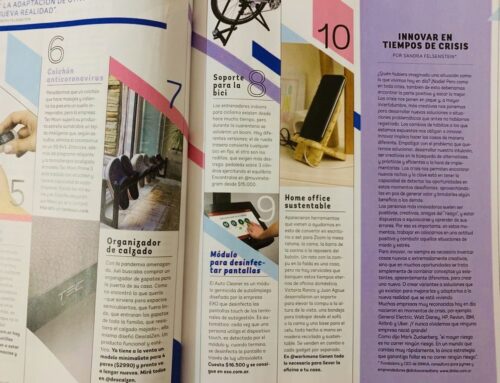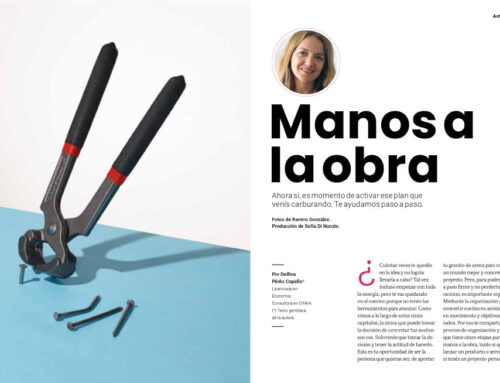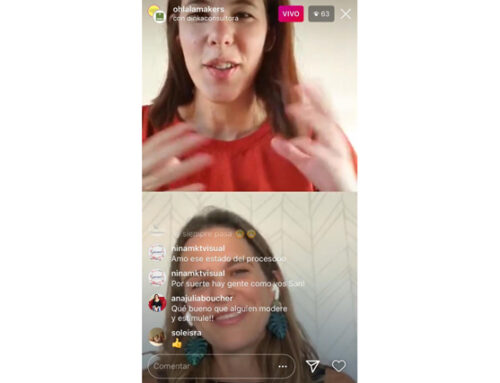The story of small and medium-sized firms that managed to take the leap and become large companies. How did they achieve it? The stories of their leaders and the advice of specialists.
You grow from smallest to largest, there is no other way. No company is born billing millions of pesos, or having a portfolio of important clients. It is a path that is traveled overcoming obstacles. To achieve it, it is necessary not only to desire it but to plan it, prioritize the professionalization of the company and be attentive to opportunities, the specialists highlight. “To think big, you simply have to think, it's that simple,” summarizes Miguel Logarzo Azúa, chairman of Vistage Argentina, an organization that brings together CEOs. In this sense, his colleague Adriana Turdera explains, “planning the growth of a company allows us to identify the guiding idea of the business, making the necessary corrections to meet the established objectives.”
Apex América is a company from Córdoba specialized in Business Process Outsourcing (BPO) services, which today operates in six Latin American countries (Argentina, Brazil, Chile, Paraguay, El Salvador and Honduras). It employs around 5,100 people and, in 2016, had a turnover between US$73.6 million and US$66.4 million. By 2018, they plan to exceed US$100 million and land in new countries. However, this was not always the case.
At the beginning, in 2005, its founders, Marcelo Cid and Humberto Sahade, bet that Apex would export its contact center services, focusing on the North American market. The decision was a success: for foreign companies, Argentina was an attractive market due to its low costs and the quality of human resources. It was so interesting that Sykes, an American company decided, in 2006, to hire Apex's services. Shortly after, they bought it. However, as Argentina lost competitiveness, Sykes began his withdrawal. Cid and Sahade decided to buy back their firm, but understanding that the context had changed: if they wanted to survive, they had to focus on the domestic market. With this decision, they not only managed to lift the company from its decline but also made it grow.
For Patricio Ríos Carranza, CEO of Apex América, there were three key elements on that path. The first was having a dream, distinctive competence and its human resources. Regarding the dream, he explains that it is nothing other than the vision of the company, the aspiration of what one wants to be. "Any project that is born must have a dream. From the very beginning, Apex dreamed of being a global firm that guaranteed the professional and personal development of its people and customer satisfaction," he highlights. Regarding distinctive competence, that is, the differential with respect to competitors, Ríos Carranza assures that it is given by its work philosophy based on the values of flexibility, speed, austerity and innovation. “The greatest challenge for a company when it begins to grow and diversify is not to lose the entrepreneurial spirit and not fall into slowness and bureaucracy,” he explains.
Another key item is people, according to Ríos Carranza, the premise is that they are always a priority. "We are convinced that with happy people we are going to have satisfied customers and, with satisfied customers, we are going to have happy shareholders. This is not rhetoric, but we apply it through a program we call Closeness with other people, which implies that each process we do is designed prioritizing the bond with collaborators, because they feel happy when their leader is close and, clearly, productivity improves," he says. Apex personnel turnover, he says, is below 1.5% in the country, a percentage that, in the words of Ríos Carranza, is nothing for the industry.
Ríos Carranza joined the company in 2006, as General Manager, experienced the transfer of ownership and ended up leaving in 2009. But, when Apex returned to be owned by the Córdoba partners, he also returned to become the CEO; Today, he knows the company and its history like his own. For this reason, he says that the best advice he can give to another businessman who dreams of stopping being an SME to become a global company is: "Never betray the ideals and their definitions. The dream, the culture and the people are non-negotiable. The strategy can change 100 times, but these pillars cannot change," he concludes.
Ally, change and not miss the train
The history of Naranja dates back to 1969 in Córdoba, with the birth of Salto 96, a sports house founded by two Physical Education teacher friends: David Ruda and Gerardo Asrin. They sold sports clothing and materials. After a year, to reach a greater number of customers and retain existing ones, the partners began to offer sales in installments through a card that they themselves delivered. This system spread to other businesses in the city, which saw a way to increase their sales. However, to consolidate their growth, the two teachers understood that they needed help. For this reason, in 1995, they decided to consolidate their growth and expansion, incorporating Banco Galicia as a financial partner.
This gave them the opportunity to replicate the system in all regions of the country and expand the offer of plans and benefits to holders of the already Orange Card and, now, just Orange; That alliance was what made them take the big leap and stop being an SME. "It was a perfect alliance. My father and Ruda were two physical education teachers with limited capital to grow and they had the lucidity to look for a partner that would allow them to continue leading the operation, but that would not only give them capital but fundamentally knowledge of the financial market. At that time, Banco Galicia was also looking to venture into this type of business. I think it was a very good synergy of two Argentine businessmen concerned and busy with the country and they found the ideal partner. That alliance was very successful and is now 22 years old,” says Alejandro Asrin, current president of Naranja. In his opinion, Banco Galicia knew how to see Naranja's differential, which was always the quality of the experience.
“Opportunity is key, like other aspects of life, the train stops at the station and you have to decide whether to get on or not, knowing that it may not happen again,” says Oscar Faranda, director of the diploma in Senior Management for SMEs and Companies at the Buenos Aires Technological Institute (ITBA).
Ruda and Asrin Sr. just got on; By then, the company was only in some areas of Córdoba and a few other cities in the interior, and issued around 120,000 summaries. Today, they issue 2.9 million. “The teachers' vision was that with an alliance of this type they could provide the same financing service in other locations and grow organically throughout the country; and they were not wrong,” says Asrin.
Although they kept the premises for a time, two years after the agreement with the bank they decided to sell Salto 96 to dedicate themselves exclusively to the financial market. But, as it is about vision and flexibility, today they are working to enhance the exploitation of non-financial businesses, such as on-demand entertainment, online tourism and other services, with an investment of $12 billion this year.
That business that sold sports clothing, first to friends of its owners' teachers, became a company that has around 4.5 million customers and employs 3,200 employees. "I believe that one never has to lose the values of the SME entrepreneur. One must always be attentive to clients, take care of human capital and budgets in great detail," he advises.
one step to the side
If you want to take the ship to a successful port, the captain must be a good leader and, for Sandra Felsenstein, director of DINKA, a consulting firm specialized in SMEs, the good leader is the one who accepts proposals from his collaborators and believes in teamwork.
To do this, Federico Carassale, founder of the wholesale tourism operator Aero La Plata, has a road map to follow. He started the business in an office in the center of La Plata with five employees. Today, it has two more offices, one in Tolosa and another in Capital, it employs 130 people and has a turnover of around US$130 million. How did he achieve it? It was, according to its owner, the result of a path of professionalization that began in 2006. "The decision to surround myself with the best people was what allowed us to catapult ourselves as a successful company. I think my main virtue was having surrounded myself with people who were perhaps more suited to a Procter & Gamble; we put together a very powerful work team," he says. Marketing managers from PepsiCo, a manager from Peugeot and executives from large airline companies passed through Aero La Plata. Laughing, Carassale admits that he doesn't know how he seduced them, but he believes that what they liked most was the project and the work environment. “The main players I have are highly trained professionals who were dissatisfied in their jobs in large renowned corporations; lost souls,” he describes.
Consistent with the decision to professionalize the company, in 2014, Carassale stepped aside so that Luciano Grigera became the new General Manager. I knew that, if I wanted to take the big leap, I had to let the teams I had formed do and empower them. "Now, from management, I am in charge of providing encouragement. I believe that the company must transcend its founder. I agree with those who say that the firm is born when it stops belonging to its founder," he justifies. Grigera, the businessman says, before being the CEO, was the Financial Manager at the agency and, before that, a young talent from a financial study and the best average of his class in the accounting career at the University of La Plata.
Along this path, Carassale did ontological coaching, worked with financial, human resources and sales consultants. In addition, it sought to certify IRAM Standards and began the process to obtain System B certification.
As a result of this path, they managed to support clients such as Avantrip and position themselves among the 10 most important operators in the country, according to the ranking of the International Air Transport Association (IATA). "However, deep down, one is always an SME. It is difficult for me to consider that I am not, because in addition, we always continue to have the difficulties that small companies have," he warns.
Indelplas is a company from Junín that manufactures household appliances. Ricardo de la Fuente Villamil founded it in 1978, when he was not yet 20 years old, in an 8 x 9 shed, with a dirt floor. There he installed a press to mold cowboy boards, the first product he manufactured. "In Junín, far from raw materials, without experience and without the possibility of bringing in a veteran from another company as technical support, the theory said that you couldn't do well. But I was deeply convinced of what I wanted to do and at that age you have the opportunity to hit yourself, fall and get back up a lot of times," he says.
the market commands
Turdera maintains that growth requires, among other things, “active listening to the transformation of demand, thus obtaining competitive advantages over other players in the same market.” De la Fuente had his ears wide open: he recognizes that what gave him the opportunity to take the first big leap were the adapters with three inclined flat legs. "We developed them in '86, when electrical standards began to change in Argentina, we stopped using round sockets and the electrometric ones began to come with flat, inclined legs. A mistake in terms of competitiveness and global insertion. But the market asked for it and we did it; we managed to sell 200,000 per month," he recalls.
Indelplast invoices $200 million per year; It is not yet a large company, according to the Undersecretary of SME Policy and Management, but De la Fuente believes that by 2018, if it maintains its sustained growth of 40%, it will reach the category of medium-sized company Tranche 2, the last step it needs to become a large firm. "Our growth is sustained. We have 70 permanent staff. In 2015, we were 34. My explanation is that we do what others do not do: diversify, innovate, invest and seek to be competitive based on market opportunities," he highlights.
Among the challenges achieved, which the businessman defines as “formidable”, is having inaugurated an administrative building with two floors of 500 m2, which they built in seven months. "It went well for us because as a rule we invest 90% of the profits, and there is a premise in the company that must be strictly adhered to, which is to improve people's quality of life. Every product we launch we do so so that it is the best on the market. This represents an enormous challenge for us in terms of price, in the process of product development, we have to carefully analyze what would be the necessary components for us to be competitive. Indelplast is not a leading brand, so we have to be cheaper than all the well-known brands; Nobody is going to buy from us just because we are good,” he explains.
Since 2010, he adds, they have been working on a deep process of modernization, incorporating robotics and automation, thanks to alliances they achieved with companies from Spain, Portugal and China. “The idea is to have increasingly efficient production processes and be able to achieve the highest productivity per operator in this sector,” he concludes.








